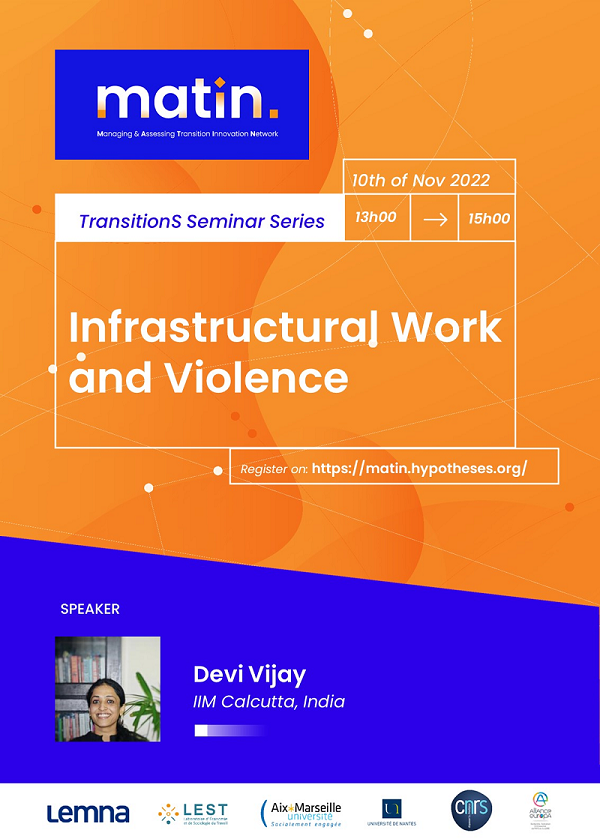MATIN TransitionS Inaugural Seminar
Jeudi 10 novembre 2022
-
LEST, En ligne
Animation Héloïse Berkowitz, Mathias Guérineau
On the 10th of November we will have the pleasure to host an inaugural seminar of our transition series (Season 2) on vulnerabilities. Save the date ! At 13.00 CET, we will listen to Devi Vijay, Associate Professor, IIM Calcutta, India, on “"Killing us with Slow Poison": Infrastructural Work and Violence in a Global City"
“Killing Us with Slow Poison”: Producing Infrastructural Violence and Work in the Global City.
Abstract
In this study, we attend to how slow violence unfolds at a frontier of capitalist accumulation. We build on infrastructure as an analytic to understand how injury is differentially distributed. Over multiple years of fieldwork at a settlement next to a garbage landfill in one of India’s Global Cities, we document how infrastructural violence wastes bodies and life-worlds. We trace the organized practices that displace specific populations from public infrastructures and sequester them in private and philanthropic extractive networks. Those inhabiting wasting life-worlds construct alternative infrastructures through mutuality and salvage. We explore the methodological possibilities of vulnerability as praxis, wherein the researcher learns from the woundings and the unsettled habitations that arise over the course of fieldwork. We conclude with considerations on how this analytic shift from spectacular, event-based violence to everyday infrastructural violence may inform organizational scholarship on inequalities and socio-ecological transitions.
Devi Vijay is an Associate Professor at the Indian Institute of Management Calcutta. Devi’s research explores questions of inequality, institutions, and collective action, with a focus on healthcare. She has co-edited Alternative Organizations in India: Undoing Boundaries (Cambridge University Press, 2018) and Organizing Resistance and Imagining Alternatives in India (Cambridge University Press, 2022). She has published her research in various journals including Journal of Business Ethics, Organization, Journal of Service Research, Gender, Work & Organization, Public Management Review, and Marketing Theory. She was awarded the Fulbright-Nehru Postdoctoral Research Fellowship in Public Health (2016-2018).
Registration here: https://forms.gle/hLj4hMS9cEUVZFD3A
See her related works on vulnerability as Praxis
Vulnerability as Praxis in Studying Social Suffering: This chapter reflects on the possibility of vulnerability as praxis in studies of social suffering. Drawing on research examining the community-based palliative care movement in Kerala, I discuss what it might mean to focus on vulnerability as an ethico-political imperative in our research process. Specifically, I explore how from a condition of vulnerability, we may adopt three modes of praxis: 1) vulnerability as susceptibility, which allows openness to silence and challenges epistemic certitude, 2) vulnerability as collective care, which acknowledges the role of time and generosities, and 3) vulnerability as learning to be affected by difference, where one learns from the wounding and the unsettled habitations that arise over the course of fieldwork. Keywords: Vulnerability, Judith Butler, social suffering, palliative care, qualitative research methods, feminist research methods
Vijay, D. (2022). Vulnerability as Praxis in Studying Social Suffering. In Emma Bell and Sunita Sengupta (Eds). Empowering Methodologies in Organisational and Social Research (pp. 55-74). Routledge India
